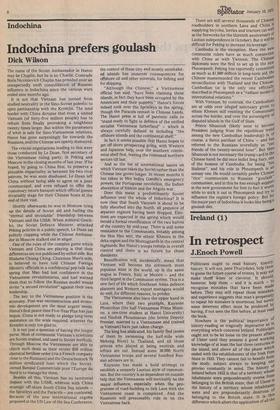Indochina
Indochina prefers goulash
Dick Wilson
The name of the Soviet Ambassador in Hanoi may be Chaplin, but he is no Charlie. Comrade Boris Nicolaievich Chaplin has presided over an unexpectedly swift consolidation of Russian influence in Indochina since the various wars ended nine months ago.
It is not that Vietnam has turned from studied neutrality in the Sino-Soviet polemic to open partisanship with the Kremlin. The land border with China dictates that even a united Vietnam (of forty-five million people) has to refrain from finally provoking a neighbour twenty times larger. But within the parameters of what is safe for Sino-Vietnamese relations, Hanoi has gone surprisingly far towards the Russians, and the Chinese are openly dismayed.
The crucial negotiations leading to this were those conducted by Le Duan, first secretary of the Vietnamese ruling party, in Peking and Moscow in the closing months of last year. If he hoped, by going to China first, to preserve a plausible impartiality as between his two rival patrons, he was soon disabused. Le Duan left' China without being able to agree on a joint communiqué, and even refused to offer the customary return banquet which official guests invariably stage for their Chinese hosts at the end of their visit.
Shortly afterwards he was in Moscow tying up the details of Soviet aid and hailing the "eternal and inviolable" friendship between Vietnam and the USSR. When Admiral Grechko, the Soviet Defence Minister, attacked Peking policies in a public speech, Le Duan sat politely clapping while the Chinese Ambassador in Moscow stalked out in anger.
One of the rules of the complex game which Vietnam and China are playing is that their differences are not publicised by either side. But Madame Chiang Ching, Chairman Mao's wife, is believed to have told Chinese Foreign Ministry officials in a confidential pep talk last spring that Mao had lost confidence in the Vietnamese revolutionaries, and had warned them that to follow the Russian model would invite "a second revolutionagainst their own leadership.
The key to the Vietnamese position is the economy. Post-war reconstruction and economic development are the most urgent needs. Hanoi's first peace-time Five-Year Plan has just begun. China is not ready to pledge long-term assistance on the scale required, whereas the Kremlin is only too glad to.
It is not just a question of having the longer purse. Most of communist Vietnam's scientists are Soviet-trained, and used to Soviet methods. Through Moscow the Vietnamese are able to clinch such deals as their recent $50 million chemical fertiliser order (via a French company close to the Russians) and the Deutschemark 70 million syndicated loan which the Sovietowned Banque Commerciale pour l'Europe du Nord is to manage for them.
Besides all this, Vietnam has no territorial dispute with the USSR, whereas with China strategic off-shore South China Sea islands — the Spratleys and the Paracels — are contested. Because of the new international regime proposed at the UN Law of the Sea Conference, the control of these tiny and mostly uninhabited islands has immense consequences for offshore oil and other minerals, for fishing and for shipping.
"Although the Chinese," a Vietnamese official has said, "have been claiming these islands, in fact they have been occupied by the Americans and their puppets." Hanoi's forces indeed took over the Spratleys in the spring, though the Paracels remain in Chinese hands. The Hanoi press is full of patriotic calls , to "stand ready to fight in defence of the unified socialist Vietnamese fatherland" — which is always carefully defined as including "the offshore islands and the continental shelf."
In fact it seems possible that Hanoi hopes to get off-shore prospecting going, with Western and Japanese help, over the southern continental shelf first, leaving the contested northern sectors till last.
And so the list of international issues on which Vietnam takes the Soviet rather than the Chinese line grows longer. In recent months it has taken in Mrs Indira Gandhi's emergency powers, the Portuguese revolution, the Indian absorption of Sikkim and the Angola war.
Does this mean a predominantly Soviet influence over the whole of Indochina? It is now clear that South Vietnam is about to be fully absorbed into the North, all pretence of separate regimes having been dropped. Elections are expected in the spring which would herald a formal reunification of the two halves of the country by mid-year. There is still some resistance to the Communists, notably among the Hoa Hao sect, the ethnic Khmers in the delta region and the Montagnards in the central highlands. But Hanoi's troops remain in overall control and there is no future for these dissidents.
Reunification will, incidentally, mean that Vietnam will become the sixteenth most populous state in the world, up in the same league as France, Italy or Mexico — and the third largest in the Communist system. This is a new fact of life which Southeast Asian defence planners and Western export managers would do well, for different reasons, to ponder.
The Vietnamese also have the upper hand in Laos, Where their two proteges, Kaysone Phomvihan (the half-Vietnamese Prime Minister, a one-time student at Hanoi University) and Nauhak Phoumsavan (the Senior Deputy Premier, married to a Vietnamese and trained in Vietnam) have just taken charge.
The king has abdicated, his family fled (some of them by swimming the half-mile wide Mekong River) to Thailand, and all those princes who played at being neutrals and leftists are out. Instead some 30,000 North Vietnamese troops and several hundred Russian advisers are in.
Kaysone has made a bold attempt to establish a uniquely Laotian style of communism. But the country is so dependent on outside help that the Vietnamese will inevitably be the major influence, especially when the programme of road-building to link Laos with the Vietnamese coast is completed. And the Russians will presumably ride in on the Vietnamese back.


























 Previous page
Previous page